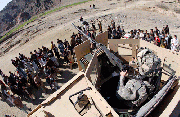
|
|
A U.S. soldier with Alpha Company, 32nd Infantry Regiment provides security during a visit by his unit at Khas Kunar refugee camp, Kunar Province, eastern Afghanistan February 18, 2009. REUTERS/Oleg Popov |
“Day by day, we see the Karzai government failing. The Americans are also failing,” said Arizad, 40, as he huddled against the cold in the stall where he sells ropes and plastic hoses. “People are not feeling safe. Their lives are not secure. Their daughters are not safe. Their land is not secure. The Karzai government is corrupt.”
“The problems we are having are made by the Americans. The Americans should review their policies,” he said Saturday. “They should not support the people who are in power.”
As Arizad spoke, Pres. Barack Obama’s special envoy, Richard Holbrooke , was holding his first talks with Karzai in the presidential palace nearby amid mounting U.S.-Afghan tensions fueled by mutual recriminations over the growing Taliban insurgency.
Some Afghan experts are worried that the United States and its NATO allies are making some of the same mistakes that helped the Taliban’s forerunners defeat the Soviet Union after a decade-long occupation that bled the Kremlin treasury, demoralized Moscow’s military and contributed to the Soviet Union’s collapse.
Among the mistakes, these experts said, are relying too heavily on military force, inflicting too many civilian casualties, concentrating too much power in Kabul and tolerating pervasive government corruption.
Violence and ethnic tensions will worsen, they warned, absent a rapid correction in U.S.-led strategy that improves coordination between military operations and stepped up reconstruction, job-training and local good governance programs.
“We have not justified democracy. We have not justified human rights. We have not justified liberalism,” said Azziz Royesh, a political activist, educator and former anti- Soviet guerrilla. “Afghans don’t like the Taliban . But we haven’t shown them a better option.”
“I see a time when again there could be thousands of unorganized insurgencies around the country,” he cautioned. “The foreigners are the ones who will be targeted. If we don’t bring change here, these kinds of incidents will add to the Taliban insurgency.”
A public opinion survey released earlier this month underscored the concerns.
The poll, commissioned by ABC News and the BBC , found that while 90 percent of Afghans oppose the Taliban , less than half view the U.S. favorably, down from 67 percent last year. Twenty-five percent also said they believed that attacks on foreign troops can be justified, up from 17 percent in 2007.
Adm. Mike Mullen , the chairman of the Joint Chiefs of Staff, conceded in a Washington Post opinion article Saturday that the U.S., which is planning to almost double the 32,000-strong U.S. force in Afghanistan over the next 18 months, will lose the war if it can’t win Afghans’ trust.






Leave a Reply